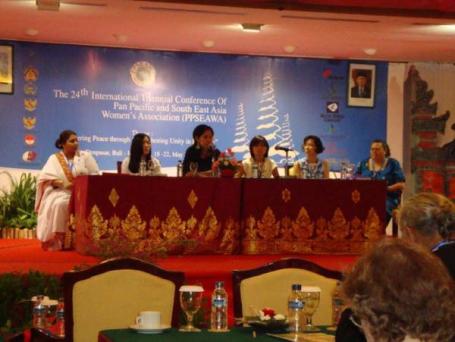
entitled “Our Young Women, Our Future” was developed by the Youth Ambassadors nominated by PPSEAWA’s International Council: Angela Lee, Kate Morioka, and Akari Yamada. We deeply appreciated the opportunity to share our voices and concerns during the conference program.
The following presentations were given at the morning panel on Friday, May 21, 2010:
- “Young Women in Pakistan” by Anny Marri, All Pakistan’s Women’s Organization and recipient of the Young Women’s Scholarship Fund
- “Korean College Life” by Elle Go-Eun Park, PPSEAWA-Korea
- “Child Brides, Stolen Lives” introduced by Akari Yamada, PPSEAWA-USA, and Eleanor Schlesinger, PPSEAWA’s UNICEF representative
- “Visioning for PPSEAWA’s Young Women” by Kate Morioka, PPSEAWA-Japan and recipient of the Young Women’s Scholarship Fund
- “Youth Leaders and Global Participation” by Angela Lee, PPSEAWA-Fiji and recipient of the Young Women’s Scholarship Fund
The session had a three-part format. We began with two country-specific viewpoints on young women in Pakistan and South Korea. Anny Marri gave a historical assessment of religion’s impact on women’s status in the post-Independence period of Pakistan. Under the democratic regime of Zulfiqar Ali Bhutto (1970–1977), women enjoyed great participation in government and the 1973 Constitution of Pakistan granted equality to women. After a military coup by General Zia ul-Haq (1977-1986), Islamization was initiated and all rights afforded to women under the Constitution were suspended. In 1988, women’s fortunes changed for the better under Benazir Bhutto, the first female Prime Minister of Pakistan and the first woman elected to head a Muslim country. A decade later, Pakistan returned to Islamic control over women’s rights when Nawaz Sharif was elected Prime Minister. Anny ended her presentation on glimmers of hope in recent times. For instance, the Ministry of Women’s Development was made independent in 2004 and the Women’s Protection Bill was passed in 2006, both under the regime of General Musharraf. Moreover, the current Prime Minister Asif Zardari passed a bill protecting women from harassment in the workplace in January of 2010.
Elle Park spoke about her personal experiences in school-based organizations such as model United Nations, offered at Yonsei University in South Korea and Waseda University in Japan. These organizations afford an opportunity for young women to acquire leadership skills. Elle concluded that it was important for young women to have a forum where they could contribute and they felt they had the ability to positively affect the world.
The second portion of the program involved active engagement of the audience in a key issue affecting girls and adolescents. Akari Yamada introduced UNICEF representative Eleanor Schlesinger who showed a 10-minute documentary entitled “Child Brides, Stolen Lives,” promoted by UNICEF’s Working Group on Girls at the United Nations. Discussions were facilitated by Akari, Eleanor, and several youth members including Ema Woodward (USA), Elle Park (Korea), Anny Marri (Pakistan), and Kate Morioka (Japan). A dialogue between youth members and participants ensued in each discussion group about the roots causes of child marriage, its adverse consequences on girls’ health and economic status, and the difficulty of its prevention. Participants also discussed programs in their own countries, which either delayed child marriage or help married adolescents improve their futures through continuing education, access to health care, and lessening isolation through mentoring.
After a coffee break, the program shifted to PPSEAWA’s future as an organization. Kate Morioka posed some provocative views held by young people about the aging membership of the organization. Participants then were divided up in groups by country to discuss how each national association could recruit, retain, and support young women. These country level discussions aimed at clarifying where youth membership actually was and where future efforts should be directed.
Angela Lee wrapped up this youth session with a fresh framework for viewing youth leaders. William Lofquist, a practitioner in the field of youth development, suggested that the ideal model was to see youth as partners in decision-making, rather than objects or passive recipients. Youth members need to know that what they are doing is meaningful and they have a voice in the organization. There can be benefits to partnership on both sides: for youth, they gain autonomy, skills and networking contacts, and for older members, they gain from continued flexibility and an expanded resource base. In the end, social and intellectual issues attract youth to organizations.
In closing, I hope we have been able to raise awareness of some obstacles that limit the participation of younger members while simultaneously presenting a few issues relevant to all women. We believe that PPSEAWA’s growth will arise from shared responsibility and joint ownership over common goals.
